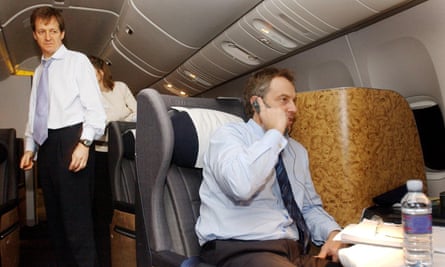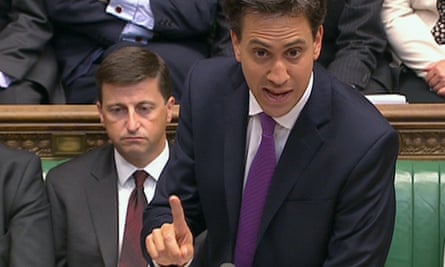On 28 April 2003, just weeks after the fall of Baghdad, Sir John Scarlett, the chair of the joint intelligence committee, went into the office of Tony Blair’s press secretary, Alastair Campbell. “How difficult would it be if it transpired we do not find evidence of Saddam’s weapons of mass destruction programme?” he asked.
With post-Saddam Iraq already tipping towards civil war, and the casus belli apparently evaporating, Campbell replied: “Very, very, very difficult.”
By then it was already obvious that the choice to go to war had turned into one of the most controversial decisions taken by a post-1945 British prime minister, but Campbell could not have foreseen how deeply British politics was to be shaped by Iraq over the next 20 years. It was to tear at successive Labour leaders, weaken the intelligence agencies and paralyse the process of authorising the use of force overseas.
Rather than prompt a sober re-examination of the true influence UK prime ministers had on US administrations, it instead took Britain further from the centre of Europe.
Above all, it poisoned the well of trust in British politics. The committee on standards in public life, set up in 1994 by the then Conservative prime minister, John Major, in response to sleaze, was good at showing that the British historically have never regarded politicians as fountains of truth (a Mori poll in 1983 found only 18% of the public said they generally trusted politicians to tell the truth, falling to 11% in 1993). The Iraq war was a different order of scandal; politicians were not caught with their trousers down or fingers in the expenses till, but instead allegedly doctoring the truth in an attempt to justify war.

The sense of public betrayal after Scarlett’s weapons search drew a blank was all the worse because Blair had come to power as the antidote to the politician’s broken contract with the British people. His persuasive skills in the weeks before the war led to a late rallying around the flag. Support for the war rose from 38% to 53% on the day of the invasion, and at the time US troops entered Baghdad had climbed to 66%. That made the subsequent debacle and Blair’s persistent defence of it an even bigger letdown.
By 2005, the leader of the Conservative party at the time, Michael Howard, was calling Blair a “Bliar”, a charge the Chilcot inquiry into the UK’s role in the Iraq war did not endorse but has nevertheless stuck. Ten years on from the war in 2013, only 27% in a YouGov poll thought it was right to have taken military action.
The process not only tarnished Blair personally, making him an impossible candidate for the post of European Commission president in the eyes of Angela Merkel, the then German chancellor, after he left Downing Street, it also obliterated much of the domestic record of a centre-left government and turned the dynamics of the Labour party after 2003 into a contest about how to view Blair, and the war.
If the war had gone well, it seems inconceivable that Gordon Brown would have been able to move against Blair so soon after he had won a third term.
But Brown also could not free himself from the war, and was found by Chilcot as being as guilty as Blair of avoiding collective decision-making. As late as his 2017 autobiography, My Life, Our Times, Brown was still seeking to absolve himself, and claimed fresh evidence showed the Pentagon actively misled the UK by withholding a highly sceptical intelligence assessment. The document was never shown to the Chilcot inquiry.
Much of the leadership of Brown’s successor as party leader, Ed Miliband, was consumed by how hard to break with the Blair legacy, including over the Iraq war.
Miliband felt he had won the leadership and defeated his brother, a former foreign secretary, to the role because he offered a bold rupture with New Labour. But many of his aides argued if Labour carried on disowning its own record in government, and Labour’s most electorally successful prime minister, the one beneficiary would be the Conservatives.
Miliband had his cathartic moment when, by voting against military action in Syria in 2013 to punish Bashar al-Assad for using chemical weapons, he led the then prime minister, David Cameron, to lose the Commons vote in an upset that led Barack Obama to abandon his red lines, and arguably to the Syrian revolution.

But the sense that the break from Blair was still incomplete spurred the grassroots insurgency that propelled Jeremy Corbyn, a politician willing to accuse Blair of enabling war crimes, to the leadership. But Corbyn did not just oppose the Iraq war; he opposed most wars and certainly the cold war bloc mentality, symbolised by Nato. His successor, Keir Starmer, an opponent of the Iraq war on largely legal grounds, has been fortunate in that Ukraine finally gave Labour a chance to move on from Iraq.
But the war did not just consume Labour and political parties, it had a traumatic effect on Whitehall. The chaos in Iraq alerted policymakers to the risks that external interventions can uncork dangerous divisions.
Blair admitted in 2016: “We underestimated profoundly the forces that were at work in the region and would take advantage of change once you topple the regime. […] The lesson is simple. It is that when you remove a dictatorship, out come these forces of destabilisation, whether it is al-Qaida on the Sunni side or Iran on the Shia side.”
He added: “To be honest, my understanding of the Middle East is a lot deeper today than it was when I was prime minister, quite frankly.”
after newsletter promotion
Campbell strikingly admits he had not foreseen that Iran would see the invasion as such an opportunity.
Cameron, who came to the premiership scarred by the support his party had shown for the war in 2003, had said he opposed the dropping of democracy from 30,000ft, but in office he too became a convert to intervention in Libya in 2011.
Hoping to have wisened after Iraq, Whitehall had drawn up elaborate plans for the day after in Tripoli but to little purpose as the fall of another strongman – this time Muammar Gaddafi – revealed a divided country.
Libya has not had a democratic election for nine years and is a playground for surrogate armies.
A further casualty was the relationship between the intelligence services and politicians as they blamed one another for the mess. Learning why the agencies misread Saddam’s weapons programme required four official inquiries. Even now, the former head of MI6 Sir Richard Dearlove told the BBC: “I don’t think the intelligence was fundamentally wrong,” a startling view in that MI6 formally withdrew some of its sources as bogus six months after the invasion.
The former Conservative MP Rory Stewart, a provincial governor in Iraq in 2003, argues that figures like Campbell, gripped by confirmation bias, simply did not cross-examine the quality of the sources he describes as “a crock of shit”.

Again, Ukraine has healed some of the scars created by Iraq. The US and UK intelligence warnings of a full-scale Russian invasion proved to be spot-on, unlike the intelligence coming out of Germany and France.
The one area the Chilcot inquiry seemed most uneasy probing was how little the UK secured in return for its conspicuous display of loyalty to the US, and what lessons to draw. Much is made of the fact that the UK persuaded George W Bush to seek a second UN resolution, but that resolution was never secured. Equally, Blair claims he struck an implicit deal that Bush would take the Israeli-Palestinian peace process seriously, but this proved to be window dressing.
Campbell admits the Americans were “calling the shots and we were trying to make differences at the edges”. Sir Jeremy Greenstock, a former UK envoy to the UN, likened the UK to being locked in the guard’s van rather than the driver’s cab. Jack Straw, the foreign secretary in 2003, admits the UK was out of the loop.
These truths could be expected to lead to a reassessment of the unrealistic weight placed by the UK on the special relationship with the US but, if anything, Greenstock argues the war instead drew the UK away from the EU.
“The linkages can be traced from the protests over Iraq in 2003 to the 2016 referendum,” he argues, since the war deepened a sense that a political elite did not listen. It may have been a winding road, but one brand of conviction politics – liberal interventionism – eventually led to another – Brexit.
